- Home
- Mark Hodder
Macallister Fogg 2: Great Great Great (And So Forth) Uncle Dragoslav Page 2
Macallister Fogg 2: Great Great Great (And So Forth) Uncle Dragoslav Read online
Page 2
Lady Hufferton sipped her tea. “Lovely. Just how I like it. I find tea so refreshing. Better, in every respect, than blood.”
Macallister Fogg swallowed and glanced at Emma. She gave a slight shrug. He looked back at the woman sitting opposite. “So you are a vampire, then, Lady Crack—er—Hufferton?”
“Of course. That is why I shall die. Properly die. No more of this undead business. You see, for the most part, my family has—for the past couple of centuries—steadfastly resisted the urges that vampirism inflicts upon us. We are committed Catholics, we expose ourselves to the crucifix, we walk in daylight, we never transform, we reflect in mirrors, and we never consume blood. We procreate as God intended and we have lived as humanly—and as humanely—as possible. That is why we are weak and diseased and fast becoming extinct. Believe me, sir, it is for the best. The Earth will be a much happier and safer place without our kind in it.”
“And your great great uncle?”
“Actually, he’s my great great great great great uncle. Dragoslav Marinko Lacusta is very, very old, and he adheres to the ancient ways. He follows the traditional path. He has no restraint. He is hungry for blood and for power. I believe he intends to make a play for the throne of my little country and, from there, to expand his evil influence into all the Balkans. But he cannot achieve this by himself; there are too many who know who and what he is; and the current monarchy has a great many supporters. That is why he would take my son. If Rupert were to be raised as a vampire—”
“Rupert?”
“The name I intend for him. He would become a puppet prince, with Dragoslav guiding his every action.”
Fogg put down his pen. “So you want me to locate your great great and so-forth uncle before he finds you, and assassinate him, thus protecting your as yet unborn son while also preventing future turmoil in the Balkans.”
“Yes, sir. That, in a nutshell, is precisely what I want.”
“There is a problem.”
“There is?”
“Yes. I don’t give credence to a single blessed word of it. It’s utter poppycock! I think you’re trying to trick me into committing an act of murder for your own political ends, whatever they may be.”
“You don’t believe in vampires?”
“Of course I don’t! All that hokum was dreamed up by the author John Polidori nearly forty years ago!”
“Actually, Mr Fogg,” Emma Boswell interjected, “Polidori drew on legends that reach back into prehistory. Vampiric folklore is particularly strong in the Balkan countries. The tales might possibly be based upon some sort of truth.”
“Balderdash!” Fogg responded. “As usual, Mrs Boswell, your imagination is running away with you.”
Lady Hufferton reached up and lifted her veil. Her eyes were of the palest grey, like a wolf’s. She was in her early thirties and stunningly beautiful. “Then much against my inclinations, I must resort to a demonstration,” she said, and her skin suddenly swelled and darkened to a corpse-like purple, then caved in on itself, folding into a myriad of wrinkles.
Fogg blinked rapidly but he couldn’t focus on her. She seemed to be melting into nothing but shadow.
Suddenly, her clothing collapsed and white mist billowed out of it, spread across the floor, and began to congeal near the door.
“Cor blimey!” the detective gasped.
Emma Boswell, who’d leaped up onto her chair when the vapour curled around her ankles, pointed a shaking finger at the roiling cloud, which rose up into a column then took on the vague form of a woman. It thickened, became opaque and, to his discomfort, Fogg found himself gazing at the totally naked form of Lady Hufferton, who appeared to have reverted to an eighteen year old.
“You’re unclothed, madam!” he croaked.
His visitor smiled, revealing long sharp canine teeth. Her taloned fingers were twice normal length and had acquired an additional joint. Her black hair floated around her head, as if she were under water. Her irises had become pinpoints. She stepped forward and her hair turned white. Another step, and her skin sagged and wrinkled. A third, and her bones cracked. A fourth, and she crumbled to the floor and turned to dust. It blew in a circle like a miniature whirlwind, flew up to the ceiling, and dropped into the clothes that hung on the seat in front of Fogg’s desk. They filled out and expanded.
“I beg your forgiveness, Lady Hufferton,” Fogg mumbled. “That was unforgivable. I assure you, I’ve never fallen asleep in front of a client before. I don’t know what came over me.”
“What you just witnessed wasn’t a dream, Mr Fogg. Or a nightmare.”
The detective bit his lower lip. He saw that Emma Boswell was still standing on the chair and still pointing toward the door. Her mouth was hanging open and she was visibly trembling.
“Did that just happen?” he asked her.
“Yes, it did. It absolutely did. It happened, Mr Fogg. Yes. Yes. It did.”
She made a loud swallowing noise.
Fogg turned back to his client.
“Very well, Lady Hufferton. Tell me more about Dragoslav Marinko Lacusta.”
II
“Four days!” Emma Boswell exclaimed. “Four days since that—that—that woman visited, and you’ve done nothing!”
Macallister Fogg looked up from his workbench. Round magnifying lenses were clipped to the bridge of his nose. They made his eyes look gigantic. “Nothing, Mrs Boswell? I’d hardly call this nothing!” He held up a large and bizarre-looking canister of wood, brass and leather, adorned with tubes and pipes, and announced, “Clockwork bellows!”
“Nothing!” his secretary repeated. “Nothing but fiddling with your expensive and preposterous inventions!”
“And reading,” Fogg added, gesturing towards a large heap of newspapers near his armchair. “You might want to have a rummage through those yourself.”
“And why, might I ask, would I want to do that?”
“Because I insist upon it, madam. I’ve circled the articles you should pay particular attention to.”
With her lips pressed tightly together, Emma stepped over to the mess and picked a copy of The London Bugle from the top of the pile.
“This is three weeks old.”
“Hum!” came the response.
Flicking through the pages, she found a short article that had been roughly circled with a pencil.
She read it then said, “A young woman, a maid, found dead in Lincoln’s Inn Fields. Cause unknown. Dogs had savaged her corpse. How thoroughly unpleasant.”
Casting the newspaper aside, she picked up another, and searched for the circled report.
“A fortnight ago. The body of a girl. Found off the Stamford Road. Thought to have bled to death.”
A third paper.
“Last Monday. Three prostitutes murdered in Mumford Court, off Cheapside. All with their throats ripped out.”
Fogg murmured, “Similar reports in every paper, spanning the past month. Regrettably, it’s not unusual. London is a violent city. What is remarkable, though, is that all the cases involve notable blood loss or the apparent disturbance of the corpses after death by animals.”
“Uncle Dragoslav, Mr Fogg?”
“I suspect so.” The detective looked up from the bellows apparatus. He removed his eyewear and waved it at his secretary. One of the lenses dropped from the frame, fell to the floorboards, rolled across them, and came to rest beside the skirting board. “Somewhere in this room, there is a street map of London. Would you find it, please? And when you do, go through all the newspapers and mark on the map the locations where the bodies were found.”
Emma nodded and began to scour the chamber. She went from shelf to shelf, lifting down books and messy stacks of documents, searching through them, then replacing them in a neat and orderly fashion. When the shelves had been thoroughly searched and tidied, she applied herself to the floor, retrieving files and papers and notebooks, which she arranged carefully on her desk, to be properly sorted later.
She located t
he map. It had been folded between the pages of a book entitled De Mythen Van Verloren Halfedelstenen by Matthijs Schuyler.
“I didn’t know you read German, Mr Fogg,” she said, holding up the volume.
“I don’t. It’s Dutch.”
“Well, I didn’t know you read Dutch.”
“I don’t. Is that the map?”
“Yes.”
“Good show! Now then, I think I may have got this working.”
He flicked a switch on the clockwork bellows and, with a deafening roar, the device blasted air into the room, sending Emma Boswell’s carefully arranged papers flying off the shelves and desk, and swirling in every direction. He clicked the switch to the OFF position and the cacophony moaned into silence.
His secretary stood with the book in one hand, the map in the other, her hair sticking straight up, and sheets of paper floating down all around her.
Fogg got his feet, said, “I have something to attend to in the basement,” and strode out of the room.
III
By the time Macallister Fogg plucked up courage enough to show his face again, Emma had drawn seventeen crosses on the map. They formed a rough circle, bordered by Coram’s Fields in the north, Lambeth in the south, Green Park in the west, and Bishopsgate in the east.
“The hunting ground,” Fogg said. “According to Lady Hufferton, a hungry vampire is driven by instinct and operates with little finesse. Uncle Dragoslav won’t often return to the same area where he’s made a kill, but he will always travel more or less the same distance to feed. It’s therefore safe to assume that he’s holed up somewhere here—” He placed his finger in the middle of the circle.
“Covent Garden?”
“More likely the Strand.”
“Why?”
“There aren’t many houses for rent in that area of the city—certainly none in Covent Garden—so he’s probably made his nest in a hotel, of which there are plenty along the Strand, many suitable for a visiting dignitary.”
Emma Boswell clapped her hands, smiled, and said, “One day, Mr Fogg, Baker Street will be inhabited by an investigator of such deductive brilliance that all the other detectives will be put out of business and driven away. If you carry on in this vein, you could be that man. Whenever Baker Street is mentioned, people will think: Macallister Fogg, Consulting Detective.”
Fogg gave a snort. “While on the trail of a vampire, Mrs Boswell, it might be wise to refrain from using words such as vein.”
She conceded the point. “What next, then?”
“I want you to go to the Strand and have a nose around. Perhaps you’ll strike lucky.”
“I can see nothing lucky about encountering a vampire!”
“You’ll be all right. Just don’t go anywhere that isn’t teeming with people. No dark alleyways or abandoned buildings. Nowhere by yourself. If you track him down, come back here at once. On no account approach him. And whatever the case, be sure to return before nightfall. Is that clear?”
“Patently. And thank you for scaring me silly.”
“I have a gift for you, Mrs B. A necklace.”
“Why—er—thank you, Mr Fogg—that’s—that’s—really, there’s no need. A simple apology would have been perfectly acceptable. No need for a grand gesture—or—or—”
Fogg paced over to one of his workbenches, lifted a brown paper bag from it, and pulled out something wrapped thickly in newspaper. He tore the packaging open and held up a looped string of garlic.
“Tah dah!” he sang.
A pungent odour filled the room.
Emma’s knees appeared to buckle slightly. Her eyes bulged. Her complexion darkened. She tried to talk, produced nothing but unintelligible noises, and finally got out a single word. “Beast!”
“Quite so,” Fogg agreed. “Uncle Dragoslav is a beast of the first order, which is precisely why every precaution must be taken. Wear this necklace, Mrs Boswell, and under no circumstances remove it until you are safely home.”
“It stinks to high heaven!”
“A small price to pay when stalking a creature that has the stench of hell about it!”
Fogg’s secretary raised a hand to her forehead. She nodded. “Yes, I suppose so.”
It was half past four in the afternoon when, with the string of garlic around her neck, hidden beneath a jacket, overcoat, and scarf, Emma Boswell left the house by the back door. She walked across the yard, opened a gate, crossed an alley, and entered a converted stable. She lit a gas lamp to drive away the shadows, for the day was gloomy and London was wreathed in a thickening mist. The light fell across an extraordinary machine. It resembled a leather armchair suspended between two tall and narrow wheels. A small steam engine, with a thin funnel rising out of it, was held in place by brass framework at the rear of the seat, and behind this, there was a third, smaller wheel.
She opened a tiny hatch in the side of the engine, took a box of Lucifers from her pocket, lit one, tossed it into the opening, waited a moment, gave a grunt of satisfaction, and closed the little door. After adjusting a number of tiny metal wheels and checking a couple of gauges, she left the vehicle and stepped over to the large entrance at the front of the stable. She slid its two doors aside, revealing the street beyond, then moved back to the wheeled armchair and climbed into it, resting her feet on a projecting platform.
Taking hold of a tiller rod, Emma squeezed a lever on its handle. Behind her, the engine coughed and spluttered and growled. The machine—Macallister Fogg called it an autowagon—shook and rattled violently. Using her toes, she pushed down on the footrest. The contraption rolled forward, and, by means of the tiller, she guided it out onto the road, then stopped it, dismounted, and returned to the stable to turn out the light and close the doors.
A couple of minutes later, she steered the vehicle out of Dorset Mews into Dorset Street, and from there into Baker Street, driving south toward Portman Square. The thoroughfare was busy and chaos followed her along it. Horses shied away from the autowagon, sending hansom cabs and broughams careening onto the pavement; causing merchant wagons and carts to collide; and scattering panicked pedestrians. People yelled and shook their fists at her. Others, especially street urchins, cheered at the vehicle and chased after it.
On Oxford Street, she knocked into a fruit stall, sending apples and oranges bouncing across the cobbles.
She was pursued all the way down Regent Street by barking dogs.
In Pall Mall, the drive chain slipped from the axle’s sprocket gear and the autowagon jerked to a halt. A crowd gathered around while she struggled to mend it.
“You know what you need?” the street’s resident wag asked.
“Yes. A spanner.”
“No. A bloomin’ horse!”
“Very funny!”
The man gave a disgusted grunt and stepped back. “Phew!” he exclaimed. “What’s that ‘orrible pong?”
An hour later, she reached Lancaster Place, next to King’s College and in the shadow of Waterloo Bridge, where she left the vehicle in the care of a group of sympathetic students who promised to look after the autowagon in return for the opportunity to study it.
“Right then,” she muttered to herself. “Where are you, Uncle Dragoslav?”
IV
By the time Emma Boswell returned to Baker Street, it was almost midnight.
“The devil take it!” Macallister Fogg grumbled as she stepped into the lounge or study or library or workshop. “I told you not to stay out after dark! And where in blue blazes is the garlic I gave you?”
“You’ll keep your mouth closed, sir!” she responded. “I’ve been traipsing up and down the Strand for hours; your ludicrous autowagon broke down on Oxford Street; I had to endure the mockery of the cabbies who helped me to push it all the way back here; I had to give them a tip out of the last miserable vestiges of cash in my purse; and I’m thoroughly exhausted and have no patience for any nonsense from you! As for your foul necklace, I couldn’t bear it any longer, so I threw it into
the dustbin.”
“You did what? Which dustbin? Where?”
Emma collapsed into the armchair opposite Fogg’s. “Does it matter?”
“Of course it blooming well matters!”
“Your language, sir!” she shouted. “I’ll not have it!”
Fogg raised his hands placatingly. “Forgive me, Mrs Boswell, but, please, just answer the question. Which dustbin?”
“Ours. Outside. In the back yard.”
Fogg blew out a breath. “Thank the Lord!”
Emma looked at him, puzzled. “Do you mind if I sit in my stockinged feet? My boots are killing me.”
He nodded, preoccupied, and murmured, “Take off whatever you like.”
“I beg your pardon?”
“Hmm?”
“It doesn’t matter. What have you been doing?”
“I’ve been working.”
“I’m not convinced you know the meaning of the word. You don’t work, you tinker.”
The detective remained silent, seeming lost in thought.
“And what, exactly, have you been tinkering with while I was doing what detectives are meant to do, to wit: investigating?”
“I gave the trap an overhaul.”
She turned and looked at the bare floorboards in the centre of the room. A large pentagram had been chalked on them.
“Another of your idiotic notions.”
Fogg shrugged.
With mounting frustration, his secretary said, “Are you even going to bother to ask?”
“Ask what?”
“Whether I found Uncle Dragoslav!”
“Did you?”
“Yes. He’s staying at the Venetia Royal Hotel.”
“Ah. Splendid.”
“Splendid? Splendid? Is that all you have to say? Splendid?”
“You’re absolutely certain?”
“Yes. He’s in room 313.”
“No, I mean about the dustbin. You’re certain you put the garlic in our dustbin, not in that of the neighbours?”
Emma Boswell jumped to her feet, reached up, unpinned her hat, and hurled it at her employer.

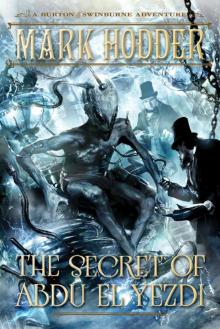 The Secret of Abdu El Yezdi
The Secret of Abdu El Yezdi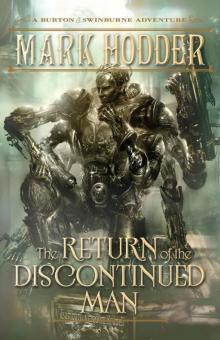 The Return of the Discontinued Man
The Return of the Discontinued Man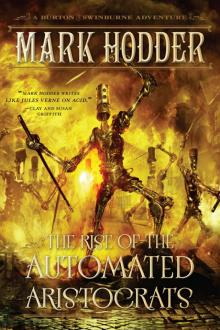 The Rise of the Automated Aristocrats
The Rise of the Automated Aristocrats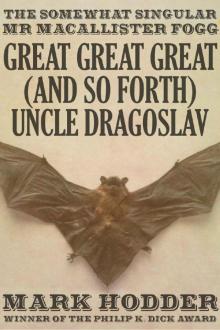 Macallister Fogg 2: Great Great Great (And So Forth) Uncle Dragoslav
Macallister Fogg 2: Great Great Great (And So Forth) Uncle Dragoslav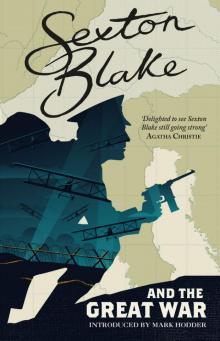 Sexton Blake and the Great War
Sexton Blake and the Great War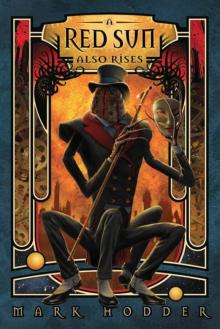 A Red Sun Also Rises
A Red Sun Also Rises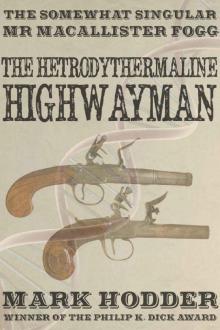 Macallister Fogg 3: The Hetrodythermaline Highwayman
Macallister Fogg 3: The Hetrodythermaline Highwayman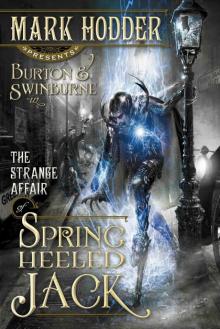 The Strange Affair of Spring Heeled Jack
The Strange Affair of Spring Heeled Jack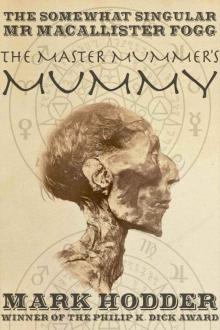 Macallister Fogg 1: The Master Mummer's Mummy (The Adventures of Macallister Fogg)
Macallister Fogg 1: The Master Mummer's Mummy (The Adventures of Macallister Fogg)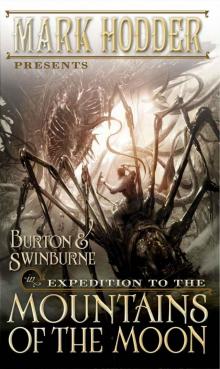 Expedition to the Mountains of the Moon bas-3
Expedition to the Mountains of the Moon bas-3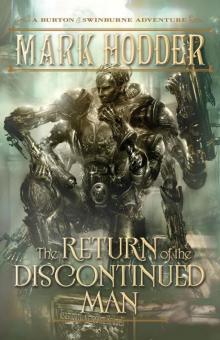 The Return of the Discontinued Man (A Burton & Swinburne Adventure)
The Return of the Discontinued Man (A Burton & Swinburne Adventure)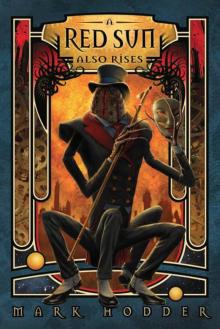 Red Sun Also Rises, A
Red Sun Also Rises, A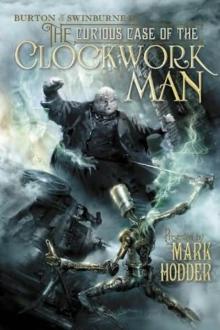 The curious case of the Clockwork Man bas-2
The curious case of the Clockwork Man bas-2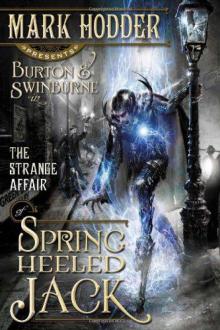 The strange affair of Spring-heeled Jack bas-1
The strange affair of Spring-heeled Jack bas-1